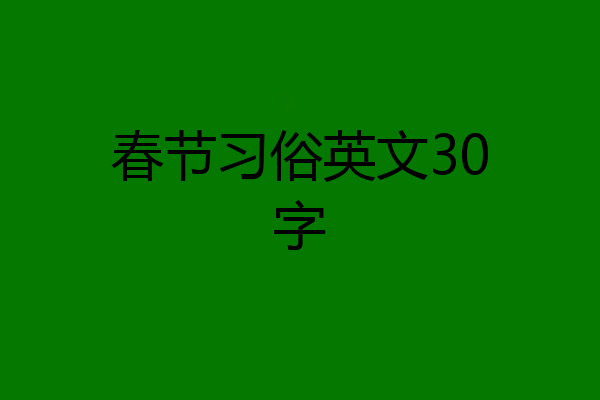
心菲殿下
The Spring Festival is from the year - long prayer sacrifice evolved.
(春节是由岁首祈年祭祀演变而来。)
In ancient times, the beginning of the New Year after the end of farming.
(上古时代人们于一岁(年)农事结束后在新一岁开端的岁首。)
Hold sacrifice activities to report heaven and earth gods, ancestors of virtue, pray for a good year.
(举行祭祀活动报祭天地众神、祖先的恩德,祈求丰年。)
Although the situation of ancient sacrificial rites is obscure, some relics of ancient customs can be found in the rites of later generations.
(古代的祭仪情形虽渺茫难晓,但还是可以从后世的节仪中寻找到一些古俗遗迹。)


静香陈陈
春节的风俗英文对照中文如下:
1、腊月二十四:扫舍去尘
Families undertake thorough house cleaning on the 24th day of the 12th month in the Lunar calendar, sweeping out the old in preparation for the coming year.
农历腊月二十四日,各家各户会进行大扫除扫舍去尘,预示着除旧迎新。
2、腊月二十五:推磨做豆腐
People turn the mill and make tofu on the 25th day of the 12th month in the Lunar calendar, as legend says the Jade Emperor will descend and taste the soybean curd residue to experience an austere life.
农历腊月二十五日,人们推磨做豆腐,因为传说玉帝会在这一日降临人间,品尝豆腐渣,体味人间疾苦。
3、腊月二十六:杀猪割年肉
The folk saying goes: "butcher a pig and get some meat to prepare for the New Year feast" on the 26th day of the 12th month in the Lunar calendar.
中国有一句俗语:“杀猪割年肉。”农历腊月二十六正是杀猪割年肉的日子。
4、腊月二十七:宰鸡赶集
People kill chickens and go to market to buy provisions for the Spring Festival on the 27th day of the 12th month in the Lunar Calendar. With the approach of the Lunar New Year, Chinese people prepare ingredients and food they need for the New Year feast. Chicken is an indispensible dish.
腊月二十七是人们动手杀鸡、上市场打年货的日子。农历新年即将到来,中国人开始准备新年团圆饭所需的食材,而鸡肉是必不可少的一道菜。
5、腊月二十八:题写桃符
After people have cleaned the house and started preparing food, they begin decorating their homes creating an atmosphere of rejoicing and festivity on the 28th day of the 12th month in the Lunar Calendar. Decorations include spring couplets, New Year pictures, posters of door gods and paper-cuts.
扫舍除尘、采购食材之后,人们开始于腊月二十八日装饰房舍,营造喜气洋洋的节日氛围。各色装饰品包括春联、年画、门神贴画和剪纸。
6、腊月二十九:上供请祖
On the 29th day of the 12th lunar month people visit the graves of their ancestors to honor their memory. It is said Spring Festival originated in the Shang Dynasty (c. 1600 BC-c. 1100 BC) from the people's sacrifice to gods and ancestors at the end of an old year and the start of a new one.
腊月二十九,人们动身扫墓,拜祭祖先。据说春节始于商朝(公元前1600年至公元前1100年),那时人们在辞旧迎新之际祭祀神灵和祖先。
7、大年三十:除夕守岁
Chinese people are supposed to stay up the whole night on the 30th day of the 12th month in the Lunar Calendar.
腊月三十,人们熬夜守岁。

张小小晴晴
春节习俗英语介绍是如下:
The Spring Festival, the Lunar New Year, is the first year of the year and also the traditional "New Year's Day".
春节,即农历新年,是一年之岁首,亦为传统意义上的“年节”。
Spring Festival has a long history, which evolved from the first year of prayer in ancient times.
春节历史悠久,由上古时代岁首祈年祭祀演变而来。
During the Spring Festival, various activities are held throughout the country to celebrate the Spring Festival, with a lively and festive atmosphere.
在春节期间,全国各地均有举行各种庆贺新春活动,热闹喜庆的气氛洋溢。
Since then, every New Year's Eve, families stick red couplets and set off firecrackers.
从此每年除夕,家家贴红对联、燃放爆竹。
Households have bright candles and wait for the new year.
户户烛火通明、守更待岁。
In the early morning of the Eleventh day, we have to go to relatives and friends to say hello.
初一一大早,还要走亲串友道喜问好。
This custom has become the most solemn traditional festival among Chinese people.
这风俗越传越广,成了中国民间最隆重的传统节日。
优质英语培训问答知识库